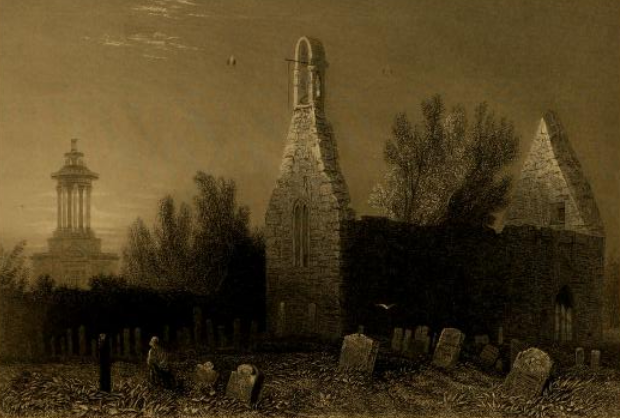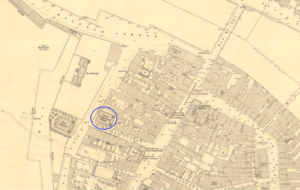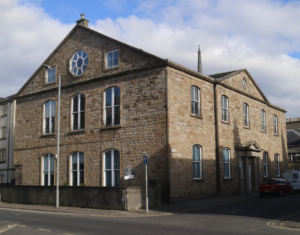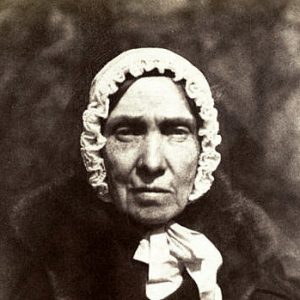
On Monday 23 March, Frederick Douglass and James Buffum travelled to Ayr, where they were welcomed by Rev. Robert Renwick of the Relief Church, Cathcart Street.


Renwick took them to Alloway to visit the cottage where Robert Burns was born and the Monument built to honour his memory, completed in 1828.
Douglass knew Burns well. The first book he bought after escaping from slavery was an edition of Burns, which he later gifted to his son Lewis, and he was presented with another edition in Scotland in 1846. He often quoted lines from Burns in his speeches.

The letter went on to pay a generous tribute to the poet – whose past trials and tribulations somewhat resembled Douglass’s own:
I have ever esteemed Robert Burns a true soul but never could I have had the high opinion of the man or his genius, which I now entertain, without my present knowledge of the country, to which he belonged – the times in which he lived, and the broad Scotch tongue in which he wrote. Burns lived in the midst of a bigoted and besotted clergy – a pious, but corrupt generation – a proud, ambitious, and contemptuous aristocracy, who, esteemed a little more than a man, and looked upon the plowman, such as was the noble Burns, as being little better than a brute. He became disgusted with the pious frauds, indignant at the bigotry, filled with contempt for the hollow pretensions set up by the shallow-brained aristocracy. He broke loose from the moorings which society had thrown around him. Spurning all restraint, he sought a path for his feet, and, like all bold pioneers, he made crooked paths. We may lament it, we may weep over it, but in the language of another, we shall lament and weep with him. The elements of character which urge him on are in us all, and influencing our conduct every day of our lives. We may pity him, but we can’t despise him. We may condemn his faults, but only as we condemn our own. His very weakness was an index of his strength. Full of faults of a grievous nature, yet far more faultless than many who have come down to us in the pages of history as saints.1
In Rochester, New York, nearly two years after his return from Britain in April 1847, Douglass was invited to address a Burns Supper. He reflected on his travels in Scotland, his meeting with the poet’s sister, and clearly could have gone on at length.
But, ladies and gentlemen, this is not a time for long speeches. I do not wish to detain you from the social pleasures that await you. I repeat again, that though I am not a Scotchman, and have a colored skin, I am proud to be among you this evening. And if any think me out of my place on this occasion (pointing at the picture of Burns), I beg that the blame may be laid at the door of him who taught me that ‘a man’s a man for a’ that.’2
In Ayr, that evening and the evening following, the abolitionists addressed enthusiastic audiences at the church. This is the report of the first speech that appeared in the Ayr Advertiser later that week.
LECTURES ON AMERICAN SLAVERY
During the last few days much interest has been excited by the visit to our town of Mr Frederick Douglass, a run-away slave, who has delivered two Lectures on the condition of three millions of his countrymen in America , and detailed the horrors of that system by which they are held in bondage. He is possessed of a surprising natural eloquence, which enables him to plead with great effect the wrongs of his dusky brethren, and the novelty of his appearance on the platform, as well as the harrowing scenes he depicted, elected from the audience the most unequivocal expressions of their sympathy. He is a tall young man, intelligently featured, with a dark complexion, and his whole appearance entirely belies the notion of the inferiority of the negro race.
On Monday evening, Mr Douglass delivered his First Lecture in the Relief Church, to a very large and attentive audience.
The Rev. Mr RENWICK occupied the chair, and after prayer, explained how the lecturer and his friend Mr Buffum, by whom he has been accompanied in all his travels, were introduced to him – stating, that it was only from an earnest desire to see the Anti-Slavery cause prosper, that he had interested himself in their behalf, and expressing his detestation of those laws by which man held his brother man in servitude and bondage. He concluded by introducing Mr Douglass.
Mr DOUGLASS began by expressing the embarrassment, and yet the pleasure he felt in appearing before an assembly of freeman. Denied as he had been all the blessings of education – for death was the penalty in slaveholding countries of teaching a slave to read – he could not be expected to make that appearance before them which he should wish; at the same time he rejoiced that they would receive him as a brother, and though he had little to attract their attention, he yet hoped the wrongs of his countrymen would excite their sympathy, and incline them to give him a candid hearing.
The little education he had received had been entirely by stealth, as he had passed twenty-one years of his life in slavery, and bore on his back the marks of its stripes. He was delighted to think that a bright day was apparently dawning on the slave – that all the world were looking with interest on whatever tended to remove that curse from the earth. If the nineteenth century was distinguished for anything, it was for a universal desire to do away with oppression amongst the great family of mankind. In every land – not only Christendom, but in heathen countries – efforts were making in favour of freedom. It was only the other day that the news came in that the Bey of Tunis had emancipated all the slaves in his dominions.
He was here to tell them the horrors of slavery – not as he read them in the books, but as he had felt them. But it would be presumptuous were he to pretend to tell of all slavery’s evils. The sin was so wide-spread, so foul, so abominable, that he was forbid to reveal the darkest secrets of that prison-house. He had not come to ask England for military aid, but to stir up that moral flood that would overleap all barriers, and hold to the light the fearful secrets that slavery knew. In America it was so interwoven in the hearts of the people and with their institutions that it would require from all countries a concentrated tide of indignation to sweep it away.
He then entered into a long explanation of the absolute power which the master possessed over his slaves, contrasting it with the state of the working classes in this country, who were sometimes represented as little better, and showing that the most galling point in the slave’s lot was just the fact that he was a slave – a marketable commodity – and esteemed no better than the brutes that perish.
What was a slave-owner? One who ruled as to what, how, and when another should work; what, how, and when he should eat; how, whom, and when he should marry; and could tear asunder those whom God had united; who could dispose of the children; who was irresponsible to man, even for life. He could torture by the burning brand, by the thumb-screw, the chain, the whipping-post and the dungeon, and none to question what he did. This was slavery.
He then stated what he considered the reasons for its popularity in America. Every one was interested in it. Ministers upheld it from the pulpit, and senators defended it in the assembly. They had 25,000 ministers who preached peace and charity on the Sabbath, and left their places of worship to torture their slaves! The slave-market and church stood side by side, and the sound of the church-going bell chimed with the bell of the slave-auctioneer.
In Britain, horror was felt for this state of things, and he thanked the public for all the expressions they had given of their detestation of them. No one knew the great influence which the public voice had upon the slave-holders. It made them tremble, even surrounded as they were by the sanctions of popularity; and every demonstration of hatred wafted across the Atlantic, had the effect of rendering their situation more and more uneasy. It was impossible to estimate the keenness of the blow inflicted on them even by the well-known lines of the poet Campbell, on the American flag –
“United States, thy banner bears
Two emblems – one of fame;
Alas! the other that it bears
Reminds us of your shame.The white man’s liberty in types,
Stands blazened by your stars;
But what’s the meaning of these stripes?
They mean your negroes’ scars.”3
Such things cut them sorely, and wounded their national pride, and be believed these lines had had more effect than a thousand lectures.
He then entered into a long vindication of his coming to this country. His personal safety had rendered it necessary, and his voice reaching the slave-holders from the free soil of Britain, would have a far more powerful influence than when raised in the midst of slave institutions, where prejudice and hatred prevailed. After adverting to the glaring inconsistency of the slave-holding principles, and the great pretensions of the Americans to Christianity, and declaring his convictions, that if the precepts of true religion were properly understood and acted on, slavery would instantly cease, he concluded by thanking the audience for the attention bestowed on him, promising to resume the subject on Tuesday evening.
The CHAIRMAN said, that after the very eloquent address they had just listened to, could any one longer entertain the opinion which had been industriously propagated in this country, that the slaves were of an inferior race, and doomed only to be the menials of the white? A most convincing proof to the contrary had this evening been presented to them, and he was confident every one had listened with the most profound interest to the long and able address of their friend Mr Douglass. He then introduced Mr Buffum to the meeting.
Mr BUFFUM gave a short account of his acquaintance with Mr Douglass, and introduced many heart-rending stories of the sufferings of the slaves, which had come under his own observation. He then traced the progress of opinion on the slave question in the United States for the last ten years, and spoke of it as now occupying a most promising position in the public mind; while referring to some obstacles which stood in the way, he severely rebuked the Free Church for the part they had taken in encouraging slavery by sending a deputation to America, who had held fellowship with the slave-holders, and taken their blood-stained money. This subject was, however, to be more fully treated in the second lecture.
Mr DOUGLASS intimated, that he would be happy to listen to any arguments which might be advanced on the following evening, against the sentiments then to be delivered with reference to the conduct of the Free Church.
The remarks of the various speakers throughout the night were repeatedly and enthusiastically cheered. Mr Renwick having pronounced the blessing, the meeting dispersed, shortly after 10 o’clock.
Ayr Advertiser, 26 March 1846
Notes
- Frederick Douglass to Abigail Mott, Ayr, 23 March 1846, in The Frederick Douglass Papers, Series Three: Correspondence, Volume 1: 1842–52, edited by John R. McKivigan (New Haven: Yale University Press, 2009), pp. 111-15 (misdated 23 April 1846). For a more detailed discussion of this letter see Alasdair Pettinger, Frederick Douglass and Scotland, 1846: Living an Antislavery Life (Edinburgh: Edinburgh University Press, 2018), pp. 151-55.
- J[ohn] D[ick], ‘Burns’ Anniversary Festival’, North Star, 2 February 1849, partially reprinted in The Frederick Douglass Papers, Series One: Speeches, Debates, and Interviews, Volume 2: 1847-54, edited by John W. Blassingame (New Haven: Yale University Press, 1982), p. 148. This speech is further discussed in Pettinger, Frederick Douglass, pp. 157-60.
- Thomas Campbell, ‘The United States of North America’ in The Poetical Works of Thomas Campbell (Philadelphia: Lea and Blanchard, 1845), p. 318.